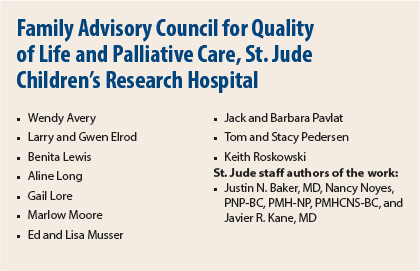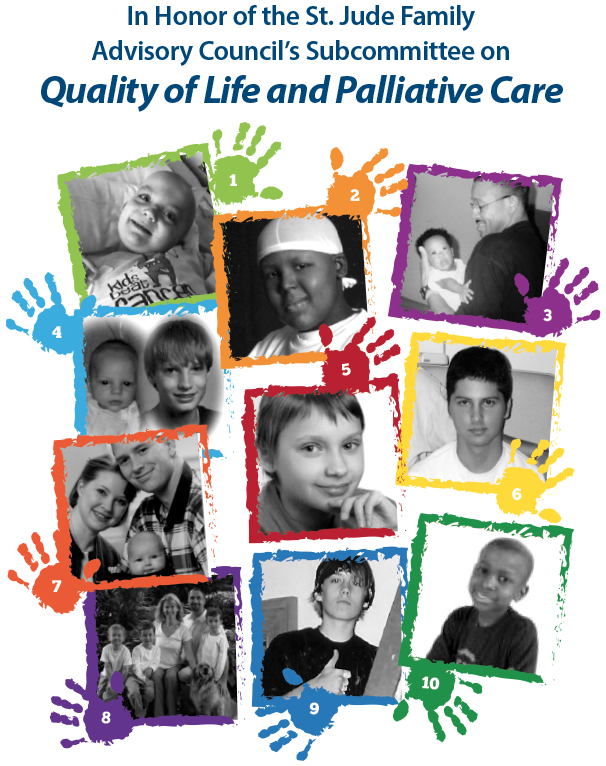About 2½ years ago, St. Jude Children’s Research Hospital in Memphis conducted a series of focus groups to better understand the palliative care priorities of bereaved parents. Their findings were never intended to be generalized, but rather to be used to formulate a strategic plan for an institutional palliative care initiative.
“The document that the parents created was so compelling, however, that I think it is deserving of a much broader readership,” Justin N. Baker, MD, FAAP, FAAHPM, Chief of the Division of Quality of Life and Palliative Care at St. Jude’s, told The ASCO Post.
That said, with this installment of Palliative Care in Oncology, The ASCO Post is pleased to present the following “Recommendations to Improve the Quality of Palliative and End-of-Life Care in Pediatric Oncology” developed by the St. Jude Family Advisory Council’s Subcommittee on Quality of Life and Palliative Care.
In a letter to The ASCO Post, the members of the subcommittee (see sidebar, page 85) quoted St. Jude’s mission statement:
St. Jude and other pediatric oncology institutions value a commitment “to provide patients with the highest quality of medical and supportive care, and their families with the level of information and support necessary for them to make informed decisions and to become active participants in the care of their children.” We support this noble ideal and urge pediatric oncology leaders to consider the list of eight care priorities identified in this document. We very much appreciate St. Jude for seeking this feedback as part of their quest to continually improve and enhance the services and support of their patients and families. Coming up with these recommendations for St. Jude and the field of pediatric oncology has been very difficult for us, as we all feel the care our children received at St. Jude was exemplary.
Because pediatric oncology issues are best addressed in a family-centered care manner, we strongly recommend the formation of institutional task forces formed by pediatric oncology leaders, health-care providers, and family members to promptly identify strategies to evaluate and improve these aspects of care.
Recommendations to Improve the Quality of Palliative and End-of-Life Care in Pediatric Oncology
As parents of seriously ill children, we recognize the importance of finding a cure for pediatric cancer and other catastrophic diseases. We also know that despite the best efforts of clinicians and researchers, children continue to die from cancer or complications of its treatment. We pray that one day we might together celebrate Danny Thomas’ dream realized when truly no child will die in the dawn of life. As we wait for that day, it is our desire to work hand-in-hand to improve the quality of life and care provided for our children and our families at St. Jude Children’s Research Hospital and around the world, beginning at the point of diagnosis of a chronic, life-threatening, and incurable disease. Therefore, the Family Advisory Council has formed a Quality of Life and Palliative Care Subcommittee composed of 14 bereaved parents. We, the parents, have identified care priorities for quality improvement and generated a list of recommendations.
The St. Jude Patient and Family Centered Care Initiative and the Division of Quality of Life and Palliative Care organized a subcommittee aimed at creating palliative care priorities that could be utilized in quality improvement initiatives as well as for strategic planning. Members of the Division of Quality of Life and Palliative Care (Drs. Javier Kane and Justin Baker) met with us, the bereaved parents, for a total of 6 hours in three separate monthly focus group meetings. Our subcommittee deliberated about our own personal experiences and commented on what we considered to be the most important priorities in the care of children with poor prognosis for long-term survival. The information provided by our focus group was documented and subsequently summarized. Eight recommendations based on identified priority areas are summarized below.
Recommendation #1: To ensure that children receive the best possible treatment of disease and have the best possible quality of life, always hoping for the best possible outcome
As parents, we have an overwhelming desire to cure our child’s illness; we want to see our children healthy and free of disease. We also recognize the need to give our children a life as normal as possible given the circumstances. We want to be empowered by the health-care team and to work with the staff in making life the best that it can be for our ill children.
The health-care team must be empathetic to the personal needs of our sick children every step of the way, from the day of diagnosis to survival, or from diagnosis to death and bereavement. Care is best when it is individualized to the particular needs of every child and family, and when it supports what we, as a family, consider what is most important for us. This may include addressing the emotional needs of parents and siblings or support of the families’ spirituality and personal or cultural values.
Health-care providers involved in the care of our children must be well educated in the provision of curative treatment and they must be knowledgeable about how to support families in the process of decision-making when cure is less likely.
Recommendation #2: To provide effective symptom control
We have an overwhelming desire to keep our children safe and comfortable without experiencing pain and suffering while they are receiving treatment. We want to be empowered by the health-care team and to work together with the staff to ensure our child’s comfort and ease of distressing symptoms.
Health-care providers must excel in communication with families about difficult issues, and must learn to recognize that physical comfort and quality of life are hugely important for us from the moment of diagnosis, and particularly when the illness progresses and cure becomes less likely. In this regard, we believe that comfort in the presence of potentially distressful symptoms and freedom from unnecessary pain and suffering should be minimized to the greatest extent possible at all stages of the journey throughout our child’s illness. We should have support from and access to experts in pain and symptom management in order to assure our child the greatest comfort possible.
Recommendation #3: To provide relationship-based care
As parents of seriously ill children, we believe that the health-care system must honor the importance of services provided in the context of trusting and meaningful relationships. Health-care providers must learn to recognize that our children are members of our larger family unit and that as parents, we desire care to be delivered to our family as a whole, as our child’s illness affects every family member.
Most importantly, we want to have access to adequately trained staff who show understanding and who we can connect with; someone who can advocate for comfort and quality of life from the time of diagnosis forward. Health-care providers must understand what we, as families being treated in the health-care system, are going through and should make every effort to meet us where we are in terms of our concerns, hopes, and personal values, and to respect and support what we consider most important in the care of our children.
Recommendation #4: To empower families with useful and reliable information
As parents of seriously ill children, we must have access to useful and reliable information in order to make the right decisions on behalf of our children, to effectively navigate a complex health-care system, and to ensure that our children have access to the services that they need.
Health-care providers must be properly trained to communicate effectively with children and their family members about difficult issues. We need health-care providers to support hope but also to remain honest and transparent when providing information about the health of our children. We need information about possible treatment choices so that we can make informed decisions. We need health-care providers to be honest about the possibility that our children may die so that, while there is still time, we can have meaningful conversations with our child and other family members about what to expect if the cancer treatment does not work.
Recommendation #5: To support children and families in the process of making difficult care decisions
As parents of children suffering from cancer and other catastrophic diseases, we recognize our obligation to make the right decisions on their behalf. We also recognize that making end-of-life care decisions is particularly difficult. We believe that decision-making should be in the hands of the family. We must receive the information that we need to make the right decisions on behalf of our children. As bereaved parents, we need to have the peace of mind that comes from having no regrets about the decisions we make in the care of our children. This means that we need the guidance and support of doctors and other health-care providers who are adequately prepared to help us establish a care plan that is consistent with our beliefs and personal values, and we need health-care providers to be respectful of our choices and supportive of our decisions.
Recommendation #6: To facilitate care coordination
Seriously ill children receive care in a very complex health-care system. We believe that this care should be well organized and coordinated throughout that same health-care system. Most importantly, we believe that health-care providers from a variety of disciplines and specialties must be able to communicate effectively with each other and collaborate effectively in the care of our children. This is particularly important at times of crisis such as during periods of hospitalization, at times of transition from the hospital to outpatient or from the hospital back to our home community, and at the end of life.
Recommendation #7: To ensure that children with progressive and incurable illness experience a comfortable and peaceful death
When our children have progressive disease and death is expected, we want to ensure that they will be comfortable and free from any unnecessary suffering. In the presence of advancing illness, we should be able to receive help from the health-care team to prepare us and our children for the possibility that they may die. We should also be able to choose where we want our child to be at the time of his or her death, and children who are not able to leave the hospital should at least be able to receive end-of-life care in a home-like environment.
Recommendation #8: To provide bereavement support for surviving family members and hospital staff
The death of each of our children has been a tragic event of immeasurable consequence in our lives and in the lives of surviving family members. Care would be best if bereaved siblings and parents had easy access to grief and bereavement support. We believe that health-care providers should receive education on how to communicate effectively with bereaved family members, and ensure that they do not feel abandoned by the staff that cared for them when their child was alive. Health-care providers should also be allowed to promote healing by creating opportunities for bereaved siblings and parents to talk about their family member and share their experiences. Health-care providers must also recognize that mothers, fathers, and siblings grieve differently, and that bereavement needs of each family member should be addressed separately with the goal of helping each family member transition back to their community and a life as normal as possible after the death of their loved one.
Our care teams are a valuable source of comfort and support for our families. We recognize that when a child dies, this also causes enormous grief for those on the medical team who cared for that child. Therefore, it is our desire that every staff member faced with caring for a dying child would receive the necessary tools and support in order to process their own grief and bereavement so that they can continue to do the difficult yet important work that is ahead of them without the effects of compassion fatigue, detachment, or burnout. ■
Addressing the evolving needs of cancer survivors at various stages of their illness and care, Palliative Care in Oncology is guest edited by Jamie H. Von Roenn, MD. Dr. Von Roenn is ASCO’s Senior Director of Education, Science and Professional Development Department.




